Basic answers to basic questions that you’ve been too afraid to ask!
We’ve all been to the doctor for a physical. We go into an exam room, have a seat, and then, it happens. A puffy, Velcro sleeve wraps around your arm. It inflates. Your doctor presses their stethoscope onto the inside of your elbow. The puffy sleeve deflates. Your doctor listens. What happens next is a bit of a blur. All the air is released from the sleeve, your doctor rips off the Velcro, and then says two numbers out loud without even making eye contact with you. What are those two numbers, anyway? Were they good? Were they bad?
‘I guess I don’t really need to know because my doctor would tell me if they were bad, right?’ Wrong.
High blood pressure, or hypertension, is present in over 30% of American adults. Hypertension contributes to approximately 365,000 deaths every year in the United States alone. That’s about 1,000 deaths per day. Paying attention to our blood pressure is a vital part of living a heart healthy lifestyle. We did some digging, and got the answers to 5 of the most frequently asked questions about blood pressure.
WHAT IS BLOOD PRESSURE?
Blood pressure is the measurement of the pressure or force of blood on the arteries.
WHAT IS THE DANGER OF HAVING HIGH BLOOD PRESSURE?
Having high blood pressure puts extra strain on your heart and arteries and over time, can lead to many health complications such as:
- Heart Disease
- Stroke
- Kidney Disease
- Vision Loss
- Sexual Dysfunction
HOW DO I KNOW WHAT MY BLOOD PRESSURE IS?
Blood pressure is measured with two factors: systolic (when the heart contracts) and diastolic (when the heart is filling). When your doctor tells you your blood pressure, they will say “number over number”. The first number is systolic, the second is diastolic. You may see the symbol “mmHg” or “mm Hg” next to your blood pressure reading. This stands for a millimeter of mercury and it is the unit with which blood pressure is measured.
HOW DO I KNOW IF MY BLOOD PRESSURE IS TOO HIGH?
This is a tough question. Many factors go into determining whether or not a person’s blood pressure level is considered to be safe. Age, family health history, race, and even gender. These risk factors are out of our control and are taken into account when determining what a safe blood pressure level is for an individual. Most doctors will say that a healthy blood pressure level is for the systolic number to be under 120 and the diastolic number to be below 80. Check out our easy to read blood pressure chart to get a gauge for where you might be. Please be sure to consult your physician regarding your blood pressure.
HOW CAN I MANAGE MY BLOOD PRESSURE?
There are many ways to keep your blood pressure low in your day to day life. Please consult your doctor before making any drastic changes to your lifestyle. Here are some modifiable factors that can contribute to high blood pressure:
- Smoking
- Being Overweight or Obese
- High Sodium Intake
- Low Potassium Intake
- Sedentary Lifestyle
- High Alcohol Consumption
- Stress
- High Cholesterol
- Diabetes
There are also certain medications that may impact your blood pressure. Ask your doctor if you are at risk of experiencing any changes to your blood pressure with the addition of medications.
FUN FACT
A 2006 study showed that systolic blood pressure can be an average of 14 points higher when taken immediately after arriving in an exam room. If your blood pressure is a little high at the beginning of your appointment, wait a few minutes and request that it be taken again! The second reading could take your numbers from “the danger zone” to “perfectly safe”!

Blood pressure is a critical factor in everyone’s health and well-being. It’s one of the first tests done at any appointment with your doctor and now, you actually know why! Take this information, and use it. Ask questions. Keep track of your own blood pressure. Modify your lifestyle to keep yourself healthy. Communicate with your doctor and create a game plan. It’s your health! Take it into your hands.
References:
The American Heart Association: https://www.heart.org/en/health-topics/high-blood-pressure/why-high-blood-pressure-is-a-silent-killer/know-your-risk-factors-for-high-blood-pressure
Centers for Disease Control and Prevention: https://www.cdc.gov/bloodpressure/infographic.htm
University of Virginia Health System: https://www.sciencedaily.com/releases/2006/04/060420232237.htm
University of California San Francisco: https://www.ucsfhealth.org/education/risk_factors_for_high_blood_pressure/






